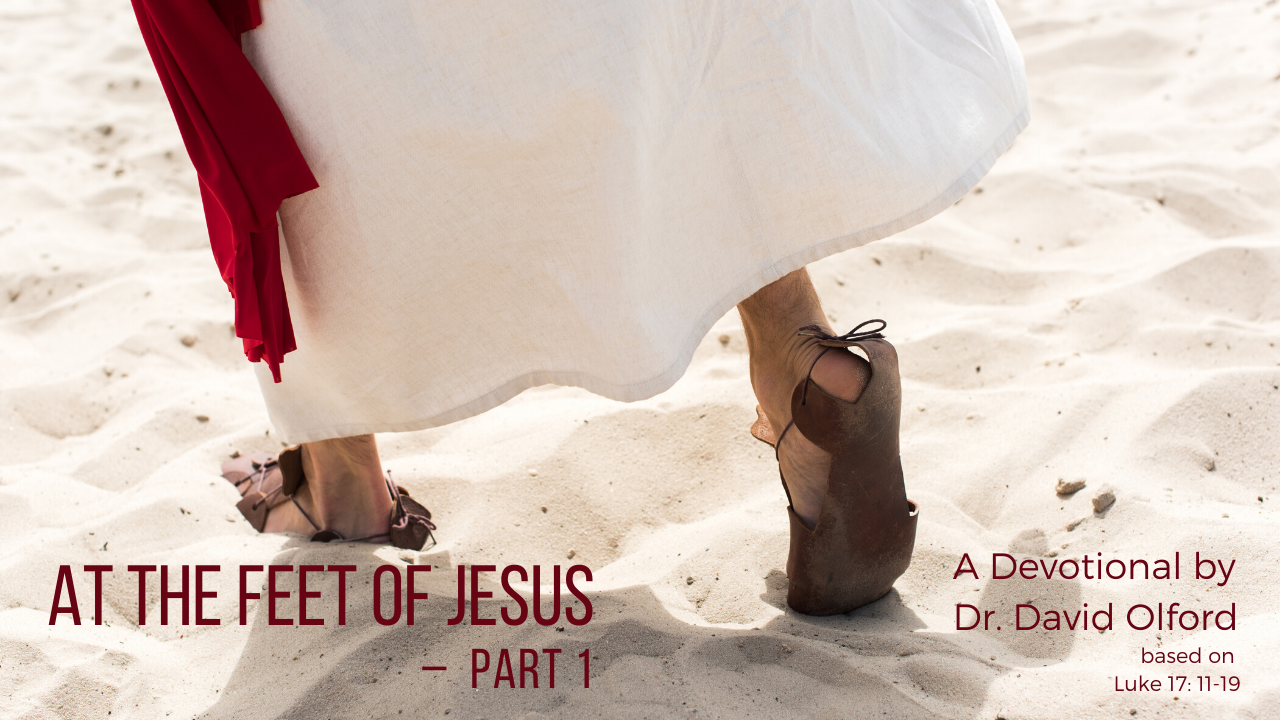Luke: At the Feet of Jesus (Part 1)

TEXT: Then, one of them, when he saw that he was healed, turned back, praising God with a loud voice; and fell on his face at Jesus’ feet, giving him thanks.” (Luke 17:15, Reading Luke 17:11-19)
INTRODUCTION: As we walk through this miracle account, I want us to fix our eyes on Jesus and to see why we ought to be at His feet as well - offering Him praise and thanksgiving. We ought to be at Jesus’ feet first of all because Jesus’ Extends Divine Mercy (in Response to Desperate Need.) (17:11-14a)
- The Cry for Mercy (Luke 17:11-13)
As Jesus entered the village, he was met by ten needy men. It is interesting to note a few things about these people in need of mercy. You see in the text that although they met Jesus, they kept their distance. This is what the Law required, and was the culture and expectation of the day. These men were alienated from other people and from religious life. They were alienated, isolated, and despised.
Second, they seemed to have been a mixed group of at least one Samaritan and Jews. Jesus’ words later (17:18) suggest that there were some Jews in the group. When you are in a desperate condition, and you know it, you don’t mind being together and seeking help together. As far as the culture of the day is concerned, regardless of the type of leprosy these men had, they basically were hopeless without divine intervention. They were relegated to the role of beggars seeking to sustain themselves on the mercy of others and then to exist in their pitiful huddles together.
Third, we don’t know how much they knew about Jesus, but they obviously knew enough to cry out to Him by name. “Jesus, Master, have mercy on us.” We don’t know their specific expectation, whether they hoped for some money, some other provisions, or if they hoped that Jesus might do a miracle. It is interesting that they called Jesus “Master,” a word unique to Luke and generally used by the disciples. It could very well have been that they did know something of Jesus’ ministry and hoped that He would indeed have mercy on them. Whatever the specific expectation, they cried for mercy.
- Jesus’ Extends Mercy (Luke 17:14)
These men not only cried out for mercy, Jesus extended or showed them mercy. In reading this passage I was struck by the simple words, “When he (Jesus) saw them he said to them,……. And as they went they were cleansed.” (17:14). He saw them and he obviously heard them, and he responded to them. So, Jesus showed mercy with His eyes and His ears. (Is it not easy to look away and not listen when we hear people crying out for help?). But, not Jesus! This account reminds me of the powerful words of the Lord God as He reveals Himself and His redemptive plan to Moses. What does He say: “I have surely seen the affliction of my people who are in Egypt and have heard their cry……..” (Ex. 3:7). Furthermore, the Lord says, “I have come down”……to bring them up out……..” (Ex. 3:8). This was the nature of Jesus’ whole ministry. He came preaching, teaching, and healing. He came to seek and to save those who were lost, and is so doing to manifest the mercy of God the Father. Jesus’ eyes were on these men and He addressed their cry. Our Savior has eyes to see those in need and seeking His mercy.
Do you remember crying out to the Lord? Maybe it was initially for His mercy to enter into His forgiveness and to be cleansed from sin. It may have been more recently due to a specific need that you’ve had, or crisis you’ve faced. What a glorious truth to know that we have a Savior, who is merciful to those who cry out to Him. These men were desperate and Jesus had mercy on them. Even for Jesus to see them and to speak to them indicates that he was addressing them in mercy.
Furthermore, Jesus spoke mercy with His words. The words of Jesus to these men, “Go and show yourselves to the priests” were words of mercy. Implicit in these words was a potential healing that they would receive if they trusted Jesus and followed His instruction. The priests were the official ones to verify that one had been cleansed from disease. These men surely would have known that, for why would he have sent them if they were not to be healed or cleansed. And they were cleansed as they went on their way.
Note that Jesus could have said, “Don’t bother me now.” He could have said, “Stay away.” He could have said, “Live with it.” Jesus saw them. Jesus heard them. Jesus spoke to them. Jesus offered them healing if indeed they would trust and obey Him.
CONCLUSION: Let’s remember as believers where it all starts - with the mercy of our Great Savior extended to us in our need.

